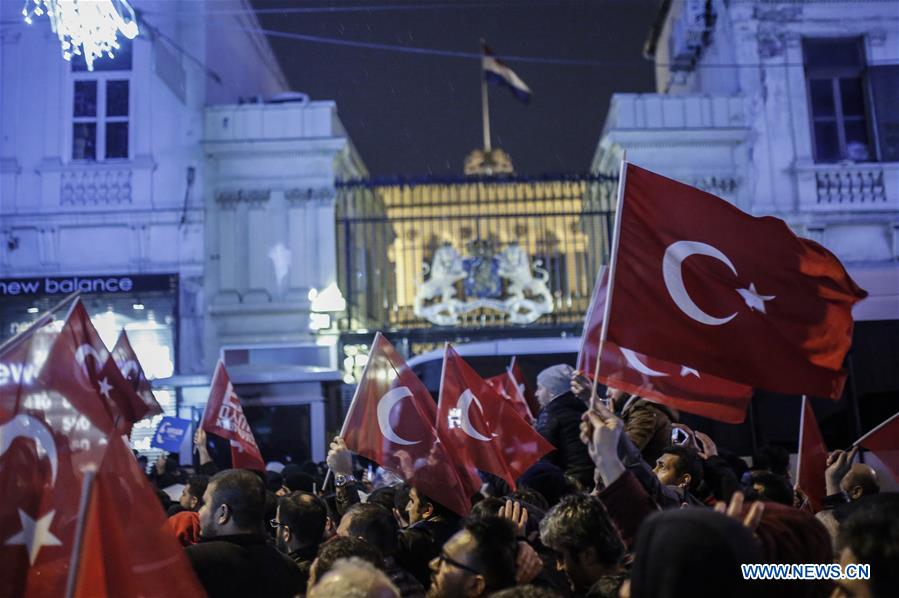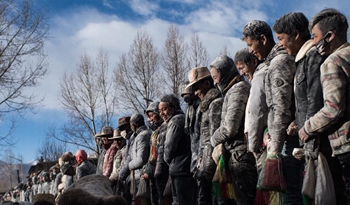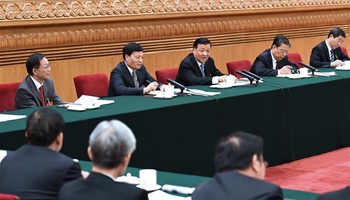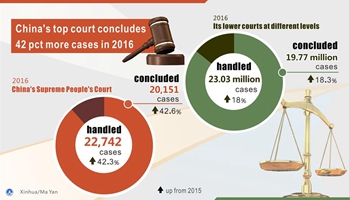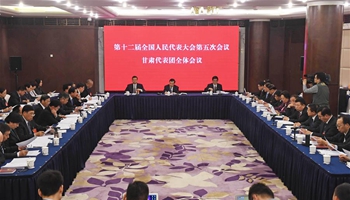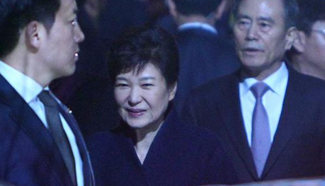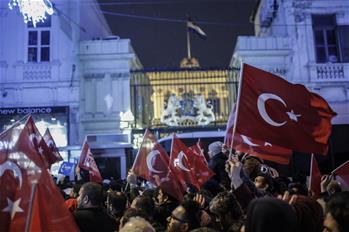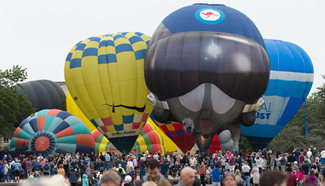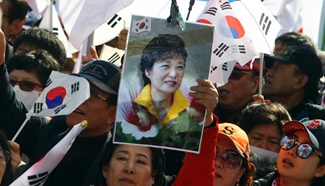People hold a rally in front of the Dutch Consulate in Istanbul, Turkey, on March 12, 2017. People holding Turkish national flags were gathering in front of Dutch Consulate in Istanbul to protest Dutch bans on Turkish politicians. (Xinhua/DHA/Depo Photos)
ANKARA, March 12 (Xinhua) -- The Netherlands has barred Turkish ministers from rally in Rotterdam in a row over Ankara's political campaigning for a referendum in April, which tensed their bilateral diplomatic ties.
The dispute escalated into a major diplomatic crisis on Saturday night when Turkey's Family Minister was prevented by police from entering her country's consulate in Rotterdam. Hundreds of protesters waving Turkish flags gathered outside, demanding to see the minister.
Dutch police used dogs and water cannon early on Sunday to disperse the crowd in a violent way. The intervention of the riot police against hundreds of demonstrators led to several arrests and many people suffered injuries, according to the local press.
"This is just unacceptable and intolerable. Turkey will surely take retaliatory measures against such a flagrant violation of the freedom of speech in an European country," said a source close to the Turkish government on Sunday.
The Turkish reaction was furious on Sunday, and the high circulation pro-government newspaper Star's main headline was "fascists' Europe."
A day after Dutch authorities banned Turkish Foreign Minister Mevlut Cavusoglu from flying to Rotterdam, an unprecedented move in diplomatic courtesy, Turkey's Family Minister Fatma Betul Sayan Kaya was prevented by a police barrage to go to the Turkish consulate in Rotterdam city and was escorted back to Germany where she came from, as she was declared "undesired" by the authorities.
In angry tweets, the minister argued that "the Netherlands is violating all international laws, conventions and human rights." "Merely tyranny and oppression. We will not surrender to this oppressive mentality."
Ibrahim Kalin, the Turkish presidential spokesman for its part tweeted "The decision by the Dutch government to ban Turkish ministers and use force against peaceful citizens mark a dark day for democracy in Europe."
The Dutch government, which stands to lose heavily to the anti-Islam party in elections next week, said it considered the visits undesirable and "could not cooperate in the public political campaigning of Turkish ministers in the Netherlands."
The government said it saw the potential to import divisions into its own Turkish minority, which has both pro and anti-Erdogan camps. Dutch politicians across the spectrum said they supported Prime Minister Mark Rutte's decision to ban the visits.
An official from the Dutch embassy in Ankara confirmed to Xinhua that the Turkish Foreign Ministry said that Ankara doesn't want, for the moment being, the Dutch ambassador who is on vacation abroad to return to the Turkish capital.
The powerful Turkish President Recep Tayyip Erdogan is looking to the large number of emigrant Turks living in Europe, especially in Germany and the Netherlands, to help clinch victory in a referendum on the April 16 that would give the presidency sweeping new powers.
The move was criticized by the opposition who claim that Turkey will become a single man rule.
Turkish authorities sealed off the Dutch embassy in Ankara and consulate in Istanbul in apparent retaliation and hundreds gathered there for protests at the Dutch action.
German Chancellor Angela Merkel has said she will do everything possible to prevent Turkish political tensions spilling onto German soil. Four rallies in Austria and one in Switzerland have been cancelled due to the growing dispute.
Erdogan has cited domestic threats from Kurdish and Islamist militants and a July coup bid as cause to vote "yes" to his executive powers which will transform the country from a parliamentary regime to a presidential one.
Foreign Minister Mevlut Cavusoglu who was barred from a similar meeting in Germany last week, threatened of harsh economic and political sanctions, saying "We will retaliate to this scandalous decision. We did not send our people to the Netherlands to become their captives. One can rest assured that we will respond to those who took this step."
Erdogan, known to be very vocal to express any kind of anger, addressed a rally of supporters in Istanbul on Saturday and shouted "They don't know diplomacy, there are remnant of nazism, they are fascists."
Dutch Prime Minister Rutte called Erdogan remarks to Nazism "a crazy remark" and argued that the Turkish leader was "way out of line."
Erdogan chafes at western criticism of his mass arrests and dismissals of people, that authorities believe were linked to a failed July attempt by the military to topple him organized according to Ankara by the influential Turkish Muslim cleric living in the United States, Fethullah Gulen.
He maintains it is clear the west begrudges him new powers and seeks to engineer a "no" vote. In the past he was not prevented by organizing big rallies in Germany nor the Netherlands.
In a written statement on Sunday, Turkish Prime Minister Binali Yildirim said Turkey would take "strong counter measures" as a response to the Dutch actions. "Our so called European friends who mention democracy, freedom of speech and human rights, have in the face of this event failed again the class."
In a rare backing to the government, the main opposition party leader Kemal Kilicdaroglu, head of the People's Republican Party, (CHP), showed unity against a "scandalous decision " from the Dutch authorities and cancelled his planned campaign in European country's for the coming days.
The Turkish expats in Europe are of a big importance for the ruling Justice and Development Party (AKP) because, according to opinion polls, a large majority of some 2 million Turkish voters there favour the actual regime and Erdogan's aspirations to boost his powers.
But in fact, Turkish law prohibits election campaigning outside the country or in this matter in foreign diplomatic missions as well. Despite the ban, most parties violate the law, including AKP and CHP.
Sinan Ulgen, chairman of the Center for Economics and Foreign Policies Studies, argues that European country's who prevent Turkish ministers to speak at rallies there should show maturity to officials from a country who negotiates its entry to the European Union and understand its "legitimate expectations."
"These countries fear that the sharp political polarisation that we witness in Turkey spills over there and disrupt the public order," added the analyst.
